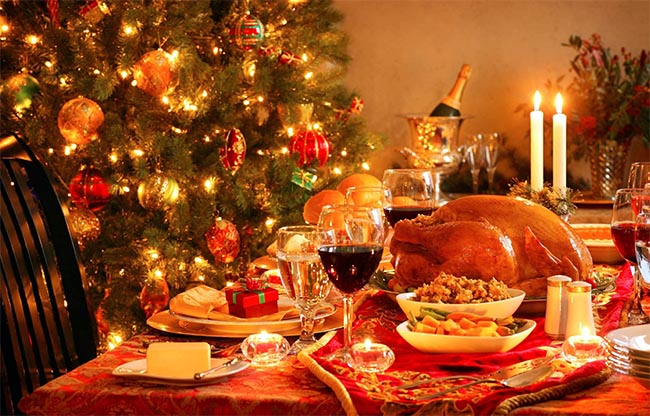Revised on 24.12.2022
Christmas and the festive season are looming up fast; this can be a difficult time for those who are watching their weight and have been making healthy changes to their diet all year. Lots of fattening favorites and savory treats to tempt us, and what about the endless party nibbles?
A sobering thought for all of us (no pun intended) is that over the Christmas period, an average person gain between 2lb-5lbs. No wonder for many of us, the lead-up to Christmas and over the festive period is the time we tend to put on those extra pounds. And worse still, that’s in a four-week period; for some of us, our healthy habits can take a backseat to the festivities.
One of the biggest mistakes people make over Christmas is focusing on the food, so don’t make this the main event. First, be realistic; just focus on maintaining your weight over the festive period if you are trying to lose weight. After all, you don’t want to feel deprived as that’s not how you are meant to feel at Christmas.
Calorie Hotspots
Sitting down to the Christmas meal with the family is not the biggest problem; you can cut calories by choosing white meat, turkey, or chicken, and if you remove the skin, you can cut another 50 calories per portion and fill your plate with veggies.
It’s really about the intake of calories on either side. The calorie hotspots are those few extra glasses of wine, munching on the mince pies, or snacking on savory treats in between. Alcohol can also be one of the main culprits for putting on the pounds; 1g of alcohol contains around seven calories, all adding up to an average of 500 extra calories a day.
Now we don’t want to be a party pooper just because you’re watching your weight, but the first key step is moderation in all things. Here are some tips on how to enjoy the festive holidays without overindulging in calories and fat.
Weight Protection Tips
Eat Smart
Eat smart over the Christmas period; some foods are loaded with calories; you can end up taking in three times over your average daily calorie intake. To help you lower your calorie intake without missing out on extra festive treats, we’ve put together some easy tips to follow.
- Start the day with a healthy breakfast, which can help regulate your appetite and blood sugar levels and increase metabolism.
- Put your food on a smaller plate to reduce portions. Go for an extra portion of vegetables instead of meat. That way, you can still taste all the foods you love without overeating.
- If you’re going to be out and about over Christmas, going to friends or at a party, it’s a good idea to eat a decent meal before you go to avoid arriving hungry.
- Party food can be disastrous for the waistline, and it’s hard to resist crisps, nuts, sausage on a stick (37 calories each), cheese straws (50 calories), and pastry base party food such as mini tartlets (45 calories), I think you’re getting the picture now. By picking these foods, we can easily consume the equivalent of a whole meal. Avoid trying a little of everything; just stick to a couple of smart choices from the buffet.
- We tend to have these nibbles laid out throughout the festive period so try not to pick at these foods before or after your meals.
- It sounds obvious, but as soon as you feel satiated and comfortable -stop eating!
- Don’t skip meals before a party or dinner. You are less likely to overeat if you have eaten well throughout the day. If you feel hungry, have a low-fat, healthy snack, your favorite fruit, or fat-free yogurt in advance.
- Before you go out to eat or sit down for a meal, try drinking a glass of water as this will help you feel fuller.
- If you find Christmas is an emotional time, whether from stress or anxiety, and tend to turn to food to help you cope, try to have an action plan prepared to take your mind away from food.
Drink Smart
Alcohol can also be one of the main culprits for putting on the pounds; 1g of alcohol contains around seven calories adding up to an average of 500 extra calories a day over and above your regular calorie intake.
- Try to limit your alcohol consumption. For example, add sparkling water to dilute your drink, or maybe add extra ice.
- Alternating each alcoholic drink with a glass of water is another good moderation trick.
- You can also add fizzy water to white wine for spritzers that will last longer with no extra calories.
- If you drink spirits with a mixer, try changing to a low-calorie mixer or use soda water instead to save on the calories.
- If you do like a drink, try to make sure that you have at least 3 or 4 alcohol-free days over the festive period.
- A little know fact is that drinking alcohol can make you eat more! Alcohol lowers blood sugar levels increasing your desire to eat.
- If you like cocktails over the festive period, be careful as some of these drinks can contain 300 calories upwards.
- One large glass of wine can contain 185 calories, that’s equal to a bar of chocolate. Most spirits (a single measure) have around 55 calories; add a mixer, and you can easily double the number of calories in a single drink.
- Avoid topping up a drink as you can lose track of the amount you’re drinking. Always finish a drink before accepting a top-up.
Regular Exercise
Regular exercise is key to avoiding weight gain. Before Christmas, that’s not so much of a problem for most of us as it’s a busy time of year. By all means, take time to chill out in the warmth of your own home, spending time with your family and watching some festive TV.
It would help if you exercise to burn those extra calories; it may be cold and dark out there, but don’t let that put you off. Exercise is a mood booster and can make you feel happier and more energized. So before you let your hair down, here are some tips for zapping those extra calories.
- If you have a regular exercise routine, try to stick to it over the Christmas period to help combat those extra calories.
- Go for an after-meal walk; taking just a 10-minute walk after a meal can help balance blood sugar levels. Try to make this your routine each day.
- Go for a walk after your meal; this not only can prevent you from overeating and picking at leftovers but is also a great way to burn off some of the extra calories you may have consumed.
- If you already have an exercise routine, try to add more cardio to your routine to burn off those extra calories.
- Hit the shops with some window shopping; walking vigorously around can burn between 300-400 calories an hour.
- If you have a bike gathering dust, go for a bike ride and give it an airing.
- Go for a swim at your local pool. Not only will it give you exercise, but it’s also an excellent way to relax from the pace and pressure of the festive period.
- Don’t forget to dance! Dancing is a full-body workout without any pain. It’s such fun that you have no idea you’ve done so much exercise.
- Get involved as a family in the children’s fun: fly a kite in your local park, play football or throw a Frisbee. It’s hard to spend quality time with your family when work pressures are on us, so the festive season is an excellent chance to have some quality family fun.

Final Words
Try to prevent festive treats from becoming bad habits. Enjoying Christmas is one thing, but you don’t want to develop unhealthy new habits or go back to your old habits. Don’t ruin your hard work if you’ve been on a diet throughout the year, just because of Christmas. It will leave you feeling de-motivated and more challenging to get back on track after the festivities. So why not try:
- Don’t buy too many snacks like biscuits, chocolates, sweets, crisps, cakes, or puddings that you will still be eating in February.
- Give away any extra goodies such as chocolates or sweets that were given to you as gifts.
- Change the bulk of your food consumption to allow for more healthy foods like turkey, meat, and vegetables and not cake, biscuits, and chocolates.
- Ensure that after consuming each meal, you feel comfortable. After all, it’s the turkey that’s stuffed, not you!
Christmas only happens once a year, and there may be plenty of temptations around at this time of the year, but the key to success is everything in moderation. Enjoying Christmas does not mean that weight gain is inevitable; Putting on a pound or two isn’t the end of the world. You need to get back on track as soon as possible after Christmas and the New Year are over, without being too hard on yourself.
Want to watch this article on YouTube? You can check out the below video.
Resources:
- Yoshida J, Eguchi E, Nagaoka K, Ito T, Ogino K. Association of night eating habits with metabolic syndrome and its components: a longitudinal study. BMC Public Health. 2018;18(1):1366. doi:10.1186/s12889-018-6262-3 https://doi.org/10.1186/s12889-018-6262-3
- Jääskeläinen A, Schwab U, Kolehmainen M, Pikola J, Jarvelin MR, Laitinen J. Associations of meal frequency and breakfast with obesity and metabolic syndrome traits in adolescents of Northern Finland Birth Cohort 1986. Nutr Metab Cardiovasc Dis. 2013;23:1002. doi:10.1016/j.numecd.2012.07.006 https://www.nmcd-journal.com/
- MacLean PS, Higgins JA, Wyatt HR, et al. Regular exercise attenuates the metabolic drive to regain weight after long-term weight loss. Am J Physiol Regul Integr Comp Physiol. 2009;297(3):R793-802. doi:10.1152/ajpregu.00192.2009
- Pellicori P, Kaur K, Clark A. Fluid management in patients with chronic heart failure. Cardiac Failure Rev. 2015;1(2):90-5. doi:10.15420/cfr.2015.1.2.90
Leave a Reply